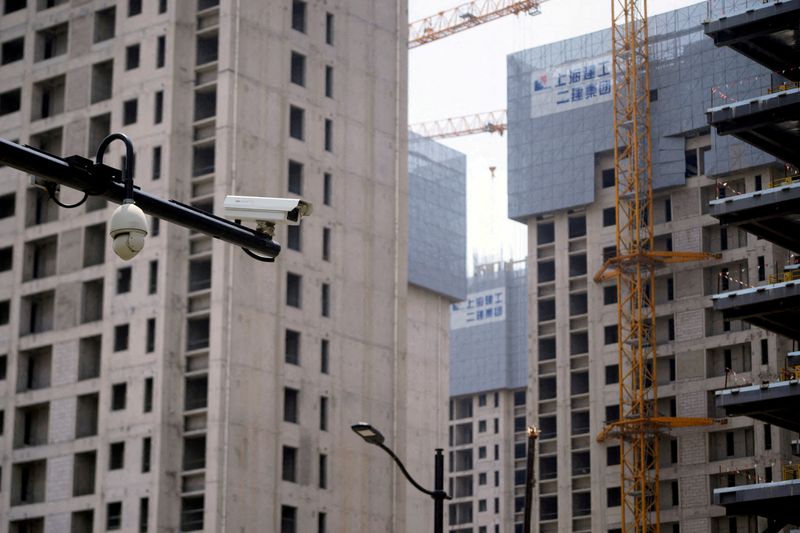BEIJING (Reuters) -Chinese regulators have told financial institutions to extend more support to property developers to shore up the country's struggling real estate sector, two sources with direct knowledge of the matter said on Sunday.
A notice to the institutions from the People's Bank of China (PBOC) and the China Banking and Insurance Regulatory Commission (CBIRC) outlined 16 steps to support the industry, including loan repayment extensions, in a major push to ease the deep liquidity crunch which has plagued the property sector since mid-2020.
The move, first reported by Bloomberg, comes as cash-strapped property developers struggle to tap sources of funding to finish projects and pay suppliers.
Several developers have defaulted on their offshore debt obligations over the past year, fuelling a property downturn which has weighed on the world's second-largest economy.
Chinese regulators are telling financial institutions to allow real estate companies to defer repayment of some loans, such as property development and trust loans, the sources said.
The sources quoted the notice as saying that if a loan is due to mature within six months, real estate companies can be allowed to defer repayments for one more year.
According to the notice, trust companies are instructed to provide financing for real estate firms on projects such as rental housing construction and mergers and acquisitions, the sources said.
The sources declined to be named because the notice was confidential. The PBOC and CBIRC did not immediately respond to Reuters' requests for comment.
The new policy "could be a game-changer for being the first comprehensive supportive policy from central authorities, unlike previous piecemeal steps," Citi analysts wrote in a note.
China's property sector, once a pillar of growth, has slowed sharply this year as the government sought to restrict excessive borrowing by developers. The clampdown has triggered falls in property sales and prices, bond defaults and the suspension of housing construction, angering homeowners which have threatened to stop mortgage payments.
Goldman Sachs (NYSE:GS) said in a note that the basic principles of the property measures are not new.
"That said, on the back of the COVID 20 'measures', the property '16 measures' may generate notable market reactions without dramatically changing the current economic fundamentals," Goldman Sachs analysts wrote, referring to steps announced on Friday to ease some of China's coronavirus curbs.
More than 200 local governments have taken steps to prop up the distressed sector this year, mainly targeting homebuyers, including by providing subsidies, cutting mortgage rates and allowing for smaller down payments. Overall demand, however, remains fragile.
The notice comes as policymakers recently ramped up support for cash-strapped developers. Chinese regulators expanded a key financing support programme designed for private firms, including real estate companies, to about 250 billion yuan ($35.18 billion) this week.
"The Chinese authorities provided a slew of supportive measures over the weekend to support the property sector, which is likely to improve the market sentiment towards the Chinese economy," said Hao Zhou, chief economist at Guotai Junan International.

"Weak property sales and investment suggest that a turnaround of (the) property outlook remains uncertain over the foreseeable future, which justifies the recent supportive measures from the Chinese authorities."
($1 = 7.1066 Chinese yuan renminbi)